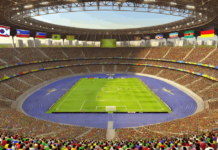
History’s most controversial refereeing decisions in soccer have sparked debates long after the final whistle. This article focuses on the critical moments where referees’ choices altered the outcomes of important matches.
Examining these decisions lets you understand how a single call can impact teams, players, and tournaments. The aim is to highlight critical incidents that remain unforgettable in soccer history.
Why Refereeing Matters in Soccer?
Referees are vital in ensuring fairness on the field. Their decisions can control the game’s flow and maintain order between players. A single refereeing mistake can affect the outcome of matches, making their role crucial.
Proper officiating is essential for fair play and the enforcing of rules. Without it, the integrity of the sport would be compromised.
The “Hand of God” – Diego Maradona, 1986 World Cup
Maradona’s “Hand of God” moment remains one of the most infamous incidents in football history. This event changed the course of a crucial World Cup match and left a lasting impact on the sport.
Argentina vs. England: Quarterfinals Overview
In the 1986 World Cup quarterfinal, Argentina faced England in a highly anticipated match. Both teams were determined to secure their place in the semifinals.
The game was intense, with both sides playing aggressively. However, Maradona’s actions made it unforgettable.
The Handball Incident
In a moment of quick thinking, Maradona used his hand to punch the ball into England’s goal. The referee missed the handball and allowed the goal to stand.
This decision sent shockwaves worldwide, as handball violations are against the rules. Maradona later referred to the goal as the “Hand of God.” It’s a moment still talked about decades later.
Aftermath and Game Impact
After the handball goal, Argentina went on to win the match 2-1. This victory pushed them forward in the tournament, eventually leading to their World Cup triumph.
The incident raised concerns about officiating accuracy in high-stakes matches and highlighted the limitations of referees in spotting critical moments without assistance.
Worldwide Reactions
Players, fans, and the media erupted in heated debates following the match. England’s players were outraged, feeling robbed of a fair chance. Meanwhile, Maradona was celebrated in Argentina as a hero.
Global media outlets were divided, some criticizing the refereeing while others marveled at Maradona’s boldness. The controversy only added to Maradona’s legendary status.
The 1966 World Cup Final – England’s Phantom Goal
The 1966 World Cup final remains one of the most debated matches in history. England’s controversial “phantom goal” against West Germany is still questioned.
England vs. West Germany: Match Overview
England faced West Germany in the final, with both teams eager for the title. The match was intense; after 90 minutes, it was tied 2-2. In extra time, England scored a third goal, but controversy followed.
The match eventually ended 4-2 in favor of England, securing their first World Cup win. However, that one goal became the center of a significant dispute.
Did the Ball Cross the Line?
England’s Geoff Hurst took a powerful shot that hit the crossbar during extra time. The ball bounced down, and many questioned if it crossed the goal line.
West Germany’s players protested, claiming it didn’t fully cross. However, the referee awarded the goal, and the controversy began.
Referee and Linesman’s Decision
Referee Gottfried Dienst wasn’t sure if the ball crossed the line. He consulted linesman Tofik Bakhramov, who confirmed the goal. Bakhramov’s decision was critical in allowing England’s third goal to stand.
The referee followed his linesman’s call despite no clear view of the event. This decision has been debated ever since.
Calls for Technology Sparked by Controversy
The “phantom goal” sparked a long-lasting debate about officiating errors in important matches. Many believe this moment highlighted the need for goal-line technology to assist referees.
It wasn’t until decades later that technology like VAR and goal-line systems were introduced. The 1966 final remains a crucial example of why technology can improve fairness in the game.
Chelsea vs. Barcelona, 2009 UEFA Champions League Semi-Final
The 2009 UEFA Champions League semi-final between Chelsea and Barcelona became infamous for controversial refereeing decisions. The outcome led to widespread frustration and raised questions about fairness.
Context of the Match and Stakes
Chelsea faced Barcelona in the second leg of the semi-final, with a place in the Champions League final on the line. Both teams were desperate to secure a win after a 0-0 draw in the first leg.
Chelsea scored early and looked poised to advance. However, Barcelona’s late equalizer meant they advanced on away goals. The referee’s performance overshadowed the match and caused significant controversy.
Missed Penalty Calls
Chelsea appealed for multiple penalty decisions throughout the game, including clear handballs by Barcelona players. Referee Tom Henning Øvrebø waved off all these claims, leading to heated protests.
Replays later showed that at least two penalty claims should have been awarded. The lack of calls left Chelsea feeling robbed of a fair result.
Outrage from Chelsea Players and Fans
Chelsea players and fans were furious after the final whistle. Didier Drogba famously confronted the referee, shouting into the camera that the match was a disgrace. Fans and media accused Øvrebø of incompetence and bias.
The controversy led to death threats being sent to the referee, and UEFA faced immense criticism for the officiating standards in such a high-stakes match.
Impact on UEFA’s Credibility
The match damaged UEFA’s credibility, as many believed it exposed flaws in refereeing at the highest level. There were widespread calls for better consistency in officiating.
This incident significantly contributed to the eventual implementation of VAR technology. The match remains a reminder of how poor refereeing can alter the outcome of major tournaments.
Thierry Henry’s Handball vs. Ireland, 2009 World Cup Qualifier
Thierry Henry’s handball against Ireland in the 2009 World Cup qualifier remains one of the most controversial moments in football. This incident prevented Ireland from qualifying and sparked widespread outrage.
France vs. Ireland Playoff for 2010 World Cup Qualification
France faced Ireland in a playoff match to decide who would qualify for the 2010 World Cup. After a 1-1 aggregate score, extra time was needed to determine the winner.
Thierry Henry’s involvement in the decisive moment became the focus of the match. France eventually won, but the way they did so left a sour taste for Ireland.
Henry’s Handball Leads to Decisive Goal
Henry controlled the ball with his hand before crossing it to William Gallas, who scored the winning goal in extra time. The referee and his assistants missed the handball, allowing the goal to stand.
Ireland protested, but the decision was final. This incident essentially knocked Ireland out of World Cup contention.
Ireland’s Appeal and Public Outcry
After the match, Ireland appealed to FIFA, requesting a replay, but their request was denied. The incident led to massive public outcry, with fans and pundits calling the match a farce.
Many saw it as unfair and accused FIFA of not upholding integrity. The controversy led to heated debates about how to avoid such situations in the future.
Impact on VAR Discussions
The handball incident was critical in discussions about introducing video assistant referees (VAR). Many argued that the handball would have been spotted immediately with VAR in place.
This event, among others, pushed FIFA to accelerate technology adoption in officiating. VAR was later introduced to prevent similar controversies.
Rivaldo’s Playacting, 2002 World Cup
Rivaldo’s exaggerated reaction during Brazil’s 2002 World Cup match against Turkey is remembered as one of the worst cases of acting in a major tournament. His actions influenced the referee’s decision to penalize Turkey unfairly.
Brazil vs. Turkey: Match Overview
Brazil and Turkey faced off in the group stage of the 2002 World Cup. The match was competitive, with both teams playing hard to gain an advantage.
As the game approached its conclusion, a controversial moment shifted the focus away from the football being played. Brazil won the match 2-1, but Rivaldo’s actions stole the spotlight.
Rivaldo’s Exaggerated Reaction
In the game’s final minutes, Turkey’s Hakan Ünsal kicked the ball toward Rivaldo, who was standing by the corner flag.
Though the ball only hit Rivaldo on the leg, he fell to the ground, exaggeratedly clutching his face. This act of playacting misled the referee and escalated the situation unnecessarily.
Referee’s Decision to Send Off Hakan Ünsal
The referee sent off Hakan Ünsal with a red card, influenced by Rivaldo’s reaction. This decision left Turkey playing with ten men, giving Brazil a clear advantage.
Rivaldo’s dishonest behavior sparked controversy and showed how easily referees can be manipulated in high-pressure matches.
Debate Over Player Behavior and Fair Play
Rivaldo’s playacting led to a broader discussion about sportsmanship and fair play in football. Many criticized Rivaldo for his actions, while others pointed out the referee’s failure to recognize the deception.
This incident emphasized the importance of holding players accountable for their actions and ensuring that referees make informed decisions in high-stakes situations.
Final Word: Impact of Refereeing Decisions on Football
The most controversial refereeing decisions in soccer have undeniably shaped the game’s history. These moments highlight the influence referees hold and how their calls can change the outcome of critical matches.
Despite advancements like VAR, controversies still arise, keeping debates alive. Ultimately, the human element in officiating ensures that these discussions remain integral to the sport’s history.






